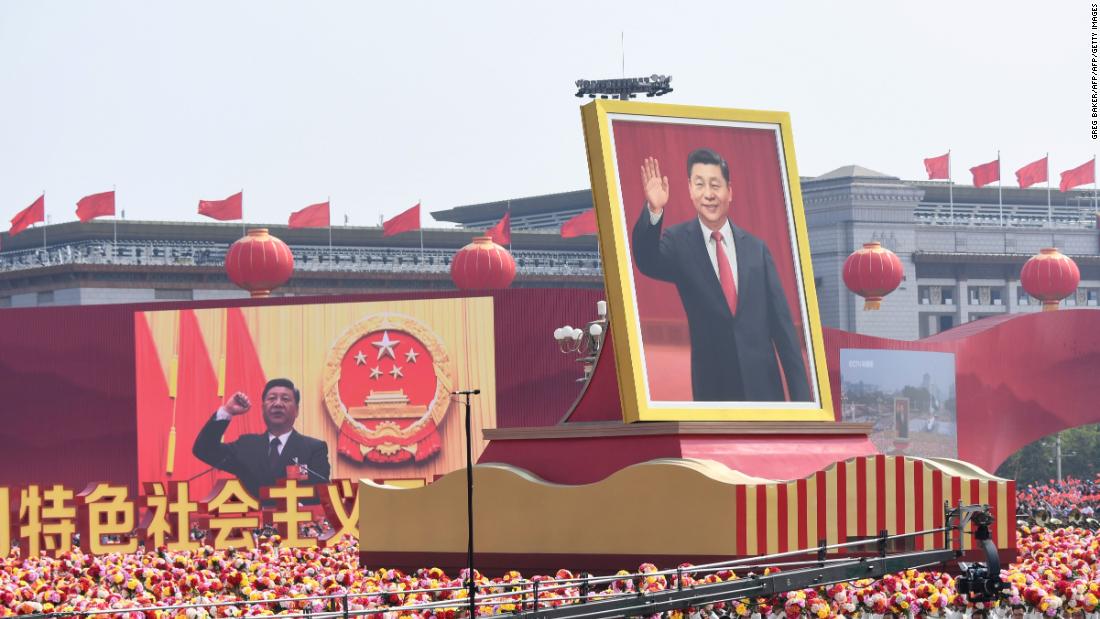
As thousands of performers took part in a stunning, highly coordinated display in Tiananmen Square -- half ultra-patriotic Olympics opening ceremony, half Chinese New Year's gala -- Hong Kong was in chaos, with fires set, subway stations and government buildings vandalized, and protesters clashing with police and residents across multiple districts.
Chinese President Xi Jinping held the world's attention Tuesday morning with a grand military parade through the capital to mark 70 years since the founding of the People's Republic. But by the time festivities resumed in the evening, all eyes were on Hong Kong, which has emerged as one of the largest thorns in Xi's side.
Protester shot by police
In the lead-up to October 1, the focus was on whether China's leaders would crack down in Hong Kong or otherwise try and stop the city from upstaging the capital with inevitable protests.
In the end, they relied on the city's beleaguered police force -- which has borne the brunt of the protests with scant support from the local government -- to handle the unrest.
But despite some 6,000 officers reportedly being deployed to the streets, they weren't able to contain the unrest. Protesters spread out across the whole city -- and it was one police officer's action that did more than anything else to upstage the celebrations in Beijing.
As tens of thousands of people took part in an unauthorized but largely peaceful protest march on Hong Kong Island, smaller demonstrations across Kowloon and the New Territories quickly turned violent. During a confrontation in Tsuen Wan, an officer fired a live round into a protester -- the first time lethal force has been used in 17 weeks of protests.
An 18-year-old man was hospitalized, and remains in a serious but stable condition. Police said the officer fired his weapon out of concern for both his own safety and that of a colleague who had been trapped on the floor and set upon by protesters.
The action sparked outrage from protesters on the streets and many of their supporters watching at home, and will help to galvanize a movement that -- while not exactly flagging -- was starting to attract smaller numbers as police efforts to arrest as many core protesters as possible and shut down demonstrations appeared to be working somewhat.
Major escalation
For months now, many in Hong Kong have been wondering when the first death directly caused by the increasingly violent protests would come, and the inevitable escalation in unrest or crackdown that would follow.
Speaking to CNN last week, a senior adviser to Hong Kong leader Carrie Lam -- who spoke on background to be candid about government thinking -- said it was "a miracle" that no one had died. The adviser, echoing the comments of many foreign observers, pointed out that if such unrest was to take place in another jurisdiction, police would likely have already used lethal force.
"Police have been extremely restrained because we've given them strict orders to be restrained," the adviser said. "We don't want to see any major fatalities."
They warned that a death linked to the protests could see the situation escalate on both sides, with more anger and violence from demonstrators, and potentially prompt the use of emergency powers by the government -- as some conservative voices have been calling for for weeks now.
"There have been very strong calls for the introduction of emergency powers," the adviser said. "It could still happen if things go further south ... if somebody dies."
The adviser predicted that the type of emergency powers used could include things like anti-mask laws, extended detention and potentially internet filtering targeting messaging apps like Telegram.
But the adviser was concerned that any declaration of an emergency by the Hong Kong government could enable Beijing to intervene -- the laws which cover the central government doing so are all structured around an emergency situation.
"Declaring an emergency would bring on so much opposition from everywhere, bring you a step closer to Beijing intervention," the adviser told CNN. "If we ourselves declare there is a state of emergency we're halfway there."
Crackdown concerns
While the city's luck appears to be holding -- with the man shot by police in a serious but not immediately critical condition -- firing a live round, even in apparently desperate circumstances, marked a major escalation, and one that may require a response.
Use of lethal force also refocused global media attention on Hong Kong, even as interest in the non-stop protests had been flagging somewhat, particularly with the pomp and ceremony in Beijing as a distraction.
Officials in charge of Tuesday evening's show -- which was stunning in its size and organization -- will have been furious to have their moment, and the country's, upstaged by a part of China that often seems to want nothing to do with the rest of the country.
The primary concern about October 1 in the city was that it would be a reason for the authorities to crack down, but an alternative interpretation argues that such a window will be provided after the festivities in Beijing are over.
Paramilitary troops have been seen on the Hong Kong border, and a large number of military reinforcements were recently moved to the People's Liberation Army garrison in the city. Once Beijing's day in the sun was complete, this theory holds, the Chinese government would have a freer hand to launch a crackdown in Hong Kong.
That Hong Kong already marred China's celebrations, and that the unrest is getting worse and more violent, may embolden those calling for Beijing to take an even firmer hand.
No comments:
Post a Comment